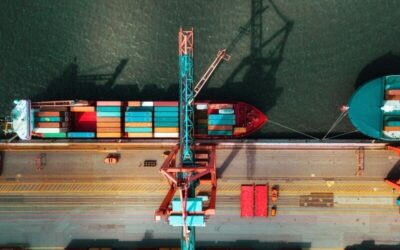Custom Clearance in UAE | A Step-by-Step Guide
As your shipment arrives in the United Arab Emirates from any point of entry from overseas, the shipment has to go through customs compliance.
This guide will discuss the customs clearance process in UAE, paperwork required, Controlling authorities, import procedure, and how to pay customs duties in the UAE.
Table of Contents
What Does Customs Clearance Mean?
A country’s customs charges and taxes are levied on goods that pass through its borders. It promotes revenue development while also protecting the economy and its residents.
Customs clearance is required when you transport goods internationally. If the consignment is cleared, the shipper must submit paperwork verifying the payment of customs duties before the package may be processed.
Local Custom Departments in UAE
Each emirate has its own local Customs compliance which in turn is governed by a federal Customs authority.
The FCA implements customs policy, monitors the implementation of customs-related laws and regulations, and represents the UAE both within and outside the country.
The Federal Customs Authority (FCA) develops customs-related policies and guidelines and represents the UAE nationally and internationally.
Local customs departments handle administrative tasks and formulate customs policy for each emirate per GCC common customs law.
The local customs department is divided into the following seven states:
- Abu Dhabi Customs
- Dubai Customs
- Sharjah Customs
- Ajman Customs
- Umm Al Khaimah Customs
- Fujairah Customs
Every state has its customs clearance mechanism. A trustworthy and professional freight forwarder can assist you with transportation services, negotiating prices with multiple carriers, and determining the most cost-effective, stable, and quickest route.
What is the Import Customs Procedure in the UAE?
The following original documents will be required for import goods in the UAE:
- Commercial Invoice
- Certificate of origin
- Packing List
- Import Permit (If Any controlling authority)
- Bill of Lading
- Letter of Duty Exemption (From Ministry of Finance)
- Original Health Certificate (for a food product)
- Original Halal Slaughter Certificate (for a food product)
The importer needs to get the authorized permit for the restricted/prohibited/duty exempted goods. Then, he files an Import Declaration application for UAE customs clearance.
Permission is required specifically from the Controlling authorities for the import of:
- Live Animal (Birds/Fish)
- Pet Animal
- Pharmaceutical Products
- Weapon/Arms
- Beverages/Alcohol/ Cigarettes
- Media Products
- Transmitters and radio equipment
- Meat/beef/poultry products
The import customs clearance procedure is influenced by a variety of factors, including:
- Policies and guidelines of the importing country
- Nature of goods and types
- Trade agreement between both countries
What are the Documents for Customs Clearance in UAE?
International shipping provides new opportunities, exciting growth, and better possibilities to any business. So, you must ensure that you are familiar with the policies and standards of exporting and importing as well as have certain shipping documents.
International trade is based on proper and complete paperwork that meets the criteria and rules set by the country of origin and the destination country. It’s necessary to have thorough information about your shipment, business, and what is the reason for the shipment.
Your shipping paperwork influences the fate of your products, and if they aren’t filled out correctly, your cargo might be delayed or held at customs.
The required documents are given below:
- 3x Original BL + Copy
- 3x Original Invoice on Shipper’s Letterhead with stamp & signature
- 3x Original Packing list on shipper’s letterhead with stamp & signature
- 2x Original Certificate of Origin
- 2x Original Phytosanitary – Food Related
- 2x Original Health Certificate – Food Related
- 2x Original Certificate of Analysis – Food Related
BILL OF LADING
- Shippers Name
- Consignee/Notify Party
- Port of Discharge
- Port of Loading
- Container No & Type
- Description of Goods
- Total Quantity & Total No. of pallets
- Total net weight & Total gross weight
COMMERCIAL INVOICE
- Shipper’s Name
- Consignee
- HS Code
- Description of goods with the invoice value
- Invoice No & Date
- Country of Origin
- Total Quantity & Total No. of Pallets
- Total of Gross weight & Total net weight
- Shipper’s letterhead with stamp & signature
PACKING LIST
- Shipper’s Name
- Consignee
- HS Code
- Country of Origin
- Description of goods
- Total of Gross weight & Total net weight
- Shipper’s letterhead with stamp & signature
CERTIFICATE OF ORIGIN (issued by Chamber of Commerce) as needed – IF THE INVOICE PROVIDED BY COUNTRY OF ORIGIN not related to FOOD, COO is not mandatory.
- Shippers Name
- Consignee
- Country of Origin
- Description of goods
- Total Quantity & Total No. of Pallets
- Total of Gross weight & Total Net weight
PHYTOSANITARY – (issued by Government Department) as needed for food-related only
- Shipper’s Name
- Consignee
- Country of origin
- Description of goods
- Total Quantity & Total No. of Pallets
- Total of Gross weight & Total Net weight
How to Calculate and Pay the Customs Duties in UAE?
Customs duties and taxes are computed using the product’s CIF value. The UAE has adopted a GCC common Tariff, including customs taxes set at 5% of the CIF value of most commodities. Where, alcohol, sweetened Beverages, and carbonated goods are subject to a 50% duty while e-smoking devices are subject to a 100% charge.
Pharmaceuticals and agricultural products are free from customs charges. Import of alcohol, tobacco, guns, and pig products are all subjects to severe restrictions.
The tax on a shipment will be 5% if the total worth of your products exceeds 1000 AED. For example, if the estimated cost of your product is 1000 AED the receiver will need to pay an extra sum of 50 AED in taxes to the destination country’s government.
The GCC Common Customs Law specifies which terms are free from UAE customs charges. The UAE FCA Unified Custom Tariff provides information on terms that are exempt from tariffs upon entering into the UAE.
Is a Customs Broker Needed?
You are not obligated to engage a customs broker. You are exclusively responsible for understanding the policies and guidelines to submit the documents on your own. Many companies and firms hire custom brokers to avoid errors or they don’t have enough information regarding the customs clearance process.
A professional custom broker will save your money by assisting you with the appropriate paperwork and inspection of products. When it comes to international trading, the clearance procedure may be quite difficult. So, importers engage a certified customs broker to help them with the customs clearance process.






